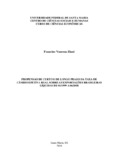| dc.contributor.advisor | Freitas, Clailton Ataídes de | |
| dc.creator | Ziani, Francine Vanessa | |
| dc.date.accessioned | 2019-04-26T14:05:04Z | |
| dc.date.available | 2019-04-26T14:05:04Z | |
| dc.date.issued | 2018-12-07 | |
| dc.date.submitted | 2018 | |
| dc.identifier.uri | http://repositorio.ufsm.br/handle/1/16320 | |
| dc.description.abstract | The goods exchange relation made between exporters and importers in many countries around the world is demonstrated to be indispensable for development. In face of this fact, the current monography investigates the possibility of validation of Marshall-Lerner's condition and aims to analyze whether the theoretically modeled variables for Mundell and Fleming actually impact on the foreign trade dynamic practiced by Brazil, testing whether the real effective exchange rate, the world income and the real gross domestic product were importante determinants for the balance of the net exports in the period from January 1999 to June 2018. The use of models of infinite distributed lags has reckoned with the experimentation of the tests of unitary roots, of cointegration and of Granger causality on the monthly data. Although it has been proven the existence of, at least, one cointegration vector, the findings did not corroborate totally with the theory and demonstrated to be discrepant with some investigated studies. It was concluded that the net exports suffer negative effects when there is positive change in the real effective exchange rate. Moreover, the proxy for world income and the Brazilian Real Gross Domestic Product revealed coefficient statistically significant and positive and negative relations, respectively, with exports. The long term propensities, finally, evidenced the worsening of the trade balance against the positive oscillations of the variables. | eng |
| dc.language | por | por |
| dc.publisher | Universidade Federal de Santa Maria | por |
| dc.rights | Acesso Aberto | por |
| dc.rights | Attribution-NonCommercial-NoDerivatives 4.0 International | * |
| dc.rights.uri | http://creativecommons.org/licenses/by-nc-nd/4.0/ | * |
| dc.subject | Exportações líquidas | por |
| dc.subject | Taxa de câmbio efetiva real | por |
| dc.subject | Propensões de curto e longo prazo | por |
| dc.subject | Net exports | eng |
| dc.subject | Real effective exchange rate | eng |
| dc.subject | Short and long term propensity | eng |
| dc.title | Propensão de curto e de longo prazo da taxa de câmbio efetiva real sobre as exportações brasileiras líquidas de 01/1999 a 06/2018 | por |
| dc.title.alternative | Short and long term propensity of the real effective exchange rate on net brazilian exports from 01/1999 to 06/2018 | eng |
| dc.type | Trabalho de Conclusão de Curso de Graduação | por |
| dc.degree.local | Santa Maria, RS, Brasil | por |
| dc.degree.graduation | Ciências Econômicas | por |
| dc.description.resumo | As relações de troca de mercadorias feitas entre exportadores e importadores nos
diversos países ao redor do mundo se mostra imprescindível para o desenvolvimento. Diante
deste fato, a presente monografia investiga a possibilidade de validação da condição de
Marshall-Lerner e busca analisar se as variáveis modeladas teoricamente por Mundell e
Fleming realmente geram impacto sobre a dinâmica de comércio exterior praticada pelo
Brasil, testando se a taxa de câmbio efetiva real, a renda mundial e o Produto Interno Bruto
real foram importantes determinantes para o saldo das exportações líquidas no período de
janeiro de 1999 até junho de 2018. O uso de modelos de defasagem distribuída infinita contou
com a experimentação dos testes de raiz unitária, de cointegração e de causalidade de Granger
sobre os dados mensais. As variáveis se revelaram não estacionárias, situação esta contornada
com a diferenciação das séries. Embora tenha sido comprovada a existência de, pelo menos,
um vetor de cointegração, os resultados encontrados não corroboraram totalmente com a
teoria e se mostraram discrepantes com alguns estudos investigados. Concluiu-se que as
exportações líquidas sofrem efeitos negativos quando há variação positiva da taxa de câmbio
efetiva real. Ademais, a proxy para a renda mundial e o Produto Interno Bruto real brasileiro
revelaram coeficientes estatisticamente significativos e relações positiva e negativa,
respectivamente, com as exportações. As propensões de longo prazo, enfim, evidenciaram a
piora da balança comercial frente às oscilações positivas das variáveis. | por |
| dc.publisher.country | Brasil | por |
| dc.publisher.initials | UFSM | por |
| dc.subject.cnpq | CNPQ::CIENCIAS SOCIAIS APLICADAS::ECONOMIA | por |
| dc.publisher.unidade | Centro de Ciências Sociais e Humanas | por |



